Diesen Monat, Publikum kann screenen Der blaue Ball on the Planet Classroom Network. This film is curated for the Planet Classroom Network by KIDS FIRST! Filmfest.
Der blaue Ball by Katherine Griffin is a heartwarming journey in which two balloons, red and blue, separated in France, spark a tale of friendship and adventure.
Join the blue balloon’s quest, accompanied by enchanting music and captivating Pixar-style animation. An emotional story of love and connection awaits audiences of all ages.
Die globale Suche nach Bildung is pleased to welcome Katherine Griffin.
Katherine, what inspired you to create the heartwarming tale of Der blaue Ball and explore the journey of these two balloons?
My producing partner and I were re-watching the 1956 Französischer Film Le Ballon Rouge one evening. For some reason, our minds both focused on the girl with the blue balloon. There’s one scene in that film when the boy and girl meet, and their balloons share a moment of being attracted to each other. We asked ourselves, “What’s her side of that story? And why is her blue balloon attracted to his red balloon?"
We were both excited about exploring it, but it took some time to finally come up with an idea worthy of the work it takes to go out and make a movie. We had been wanting to tell a story about how difficult or complicated it can be sometimes for people to connect, express themselves, and make new friendships – especially when we’re younger. To best illustrate this, we realized this story needed to be about the balloons and why they are trying to connect. When we realized it was actually a love story between the balloons, we knew we had a great story worthy of making into a film. Und, through the balloons, the boy and the girl are brought together into a new friendship.
How did you approach balancing the emotional themes of friendship and adventure in the film?
We started off right away knowing that we wanted to tell the girl’s side of the story. All too often, stories like these about the wonders and magic of childhood are told from the POV of a boy. Think of a film that captures the awe of childhood—it’s most probably about a boy. We knew we could do something different by telling her story, and we used the balloons to get into and set the emotional tone of the film.
We needed to give the balloons a sense of personality and being ‘alive’. Und, we had to do it without dialogue because, Natürlich, balloons cannot talk. So, we imagined them as best friends, playing above the city. The red balloon gets into trouble tangling its string around objects, and the blue balloon bumps it free. The blue balloon also stops to hover over a cemetery. We felt the quickest way to give the balloons a sense of being alive is to show them being aware of death.
We show our lead girl being rejected when she tries to make a friend because everyone can relate to feeling rejected. Und, it’s right at that moment the blue balloon enters her life. They are destined to be together. Throughout her day with the balloon, we see her transformation from a lonely orphan to the happy, confident explorer we know and recognize from Le Ballon Rouge. It illustrates how true friendship can completely alter your life.
Could you share insights into your creative process for achieving the captivating Pixar-style animation and music?
I love how you asked about the animation style because, Natürlich, the film is not animated. It’s live action. The balloons are digital VFX, Natürlich, but the film is entirely live action filmed on location in Paris. Aber, we wrote the story to FEEL like a Pixar film. Pixar films are so well planned and executed, and they get to the heart of a subject in the most authentic ways, so we approached Der blaue Ball with that same curiosity.
Most live action short films deal with very dark, heavy, or disturbing subject matter because it’s difficult to tell a compelling story in a very short amount of time without being shocking or tapping into an audience’s fears. Whereas animated short films often succeed by doing the opposite. They appeal to the lighter side of our emotions and tap into our basic human needs for love, Freundlichkeit, and acceptance. We wanted to write a live action film as if it were animated but filmed it live action. We set out to make a short film that anyone of any age can watch, and if they enjoy it even a fraction of how much we love the magic of the original, then we did our job.
The music plays a huge part in the emotional journey, and the soundtrack is all original, written and scored by the incredible Josh Nelson. He is a hugely accomplished jazz musician and composer based in Los Angeles and a good friend of mine for many years. We had collaborated on a previous project, and he’s a classic film lover, so I knew he was the perfect fit for Der blaue Ball. Josh excels at writing music that takes the listener on an emotional journey.
The film conveys a strong message about love and connection. What do you hope viewers will take away from this enchanting story?
We just wanted to tell a fun, uplifting story and use balloons as a symbolic reference of innocence. It can be so hard as a kid to hold onto that magic that is constantly being attacked and pulled away from us as we start to grow up. Like the original, we hope our film embodies the importance of childhood friendship and the magic that can exist in the world around us. We lose sight of it as adults, but children can see it so clearly. It’s so thrilling to know that through Planet Classroom, a new generation of young people will see our film the way we saw Le Ballon Rouge (The Red Balloon), and I hope they are equally as inspired by it.
Thank you Katherine!
C. M. Rubin and Katherine Griffin
Nicht verpassen Der blaue Ball, now streaming on the Planet Classroom Network. This film is curated for the Planet Classroom Network by KIDS FIRST! Filmfest.

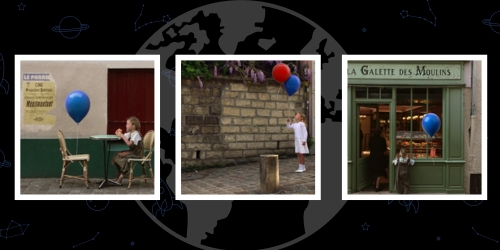
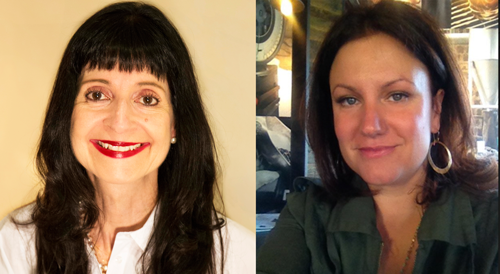
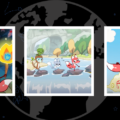
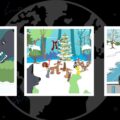
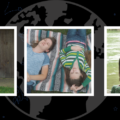

Jüngste Kommentare